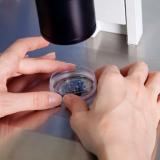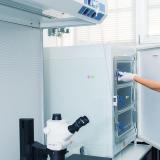NHMRC has responsibility for the permit scheme that enables the import and export of embryonic stem cell lines derived from human embryo clones.
The import and export of embryonic stem cell lines derived from human embryo clones is regulated by the Customs (Prohibited Import) Regulations 1956 (section 5L) and Customs (Prohibited Export) Regulations 1958 (section 8A).
People wishing to import or export such cell lines must apply to the Minister administering the Prohibition of Human Cloning for Reproduction Act 2002 (PHCR Act) for written permission.
Import or export will only be allowed if the cell lines have been derived using practices consistent with Australian legislation (s23C, PHCR Act).
NHMRC has responsibility for administering the permit scheme. If you wish to import or export embryonic stem cell lines derived from human embryo clones contact embryo.research@nhmrc.gov.au for more information.
The import and export of embryonic stem cell lines that were not derived from human clones is regulated through the Australian Government’s Department of Agriculture, Water and the Environment.
Export permits
Under the PHCR Act human embryo clones can only be created in Australia under a licence issued by the NHMRC Embryo Research Licensing Committee. Therefore any embryonic stem cell lines legally derived from human embryo clones in Australia must have been derived using practices consistent with Australian legislation.
See Information for applicants to apply for a licence to conduct embryo research.
An export permit will be necessary if you wish to distribute such cell lines outside Australia.
Import permits
To obtain permission to import cell lines derived from human embryo clones outside Australia you will have to show that derivation of the cell lines was consistent with Australian legislation. This includes evidence that:
- derivation of embryonic stem cell lines from human embryo clones is legal in the jurisdiction where the cell lines were derived
- derivation of the specific cell line was conducted in accordance with any regulatory requirements imposed by the jurisdiction
- the woman who donated the egg and the person whose genetic material was used had each given specific consent to derivation of the cell line and its possible distribution outside the jurisdiction where it was derived. Consent to donate eggs or genetic material to "research" is not sufficient
- any payment given to the woman was reimbursement of verifiable reasonable expenses associated with the donation of the eggs. This does not include compensation for time or discomfort.
Importing or exporting certain human embryos
Section 20 of the PHCR Act prohibits importing or exporting embryos defined as "prohibited embryos".
"Prohibited embryos" include (but are not limited to):
- Embryos created by processes other than fertilisation of a human egg by a human sperm. This includes embryos created by somatic cell nuclear transfer.
- Embryos that contain genetic material provided by more than 2 people.
- Other embryos as defined in the legislation.
If you wish to import or export embryonic stem cell lines derived from human embryo clones contact embryo.research@nhmrc.gov.au for more information.


